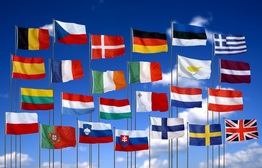The Young Person’s Guide to the EU Referendum
Rebecca Hills

With coverage of the EU referendum debate dominating the news from now until June, I thought it was time to create a guide to the EU referendum free-from political bias and jargon. So here it is: the young person’s guide to the EU referendum.
What’s a referendum?
Let’s start with the basics. A referendum is a vote by a country’s citizens on a single political question which has been referred to them for a direct decision. Put simply, it’s the government’s way of making sure a controversial political decision is made by the people instead of just by MPs. For those of you interested in history, referenda date back to the Roman Empire and are the modern equivalent to the direct democracy model used in Ancient Greece. In the UK there have only ever been eleven referenda, most of which have concerned either the EU or devolution.
What’s the EU and why is it different to Europe?
Again, another question with a relatively straightforward answer. The European Union is a select group of European countries who work together to provide economic stability and peace in Europe.
The EU was formed in 1958 and was then called the European Economic Community (or EEC for short) and consisted of six countries – Belgium, France, West Germany, Italy, Luxembourg and the Netherlands. In 1973 Britain and Ireland joined the EEC and in 1992 the Maastricht Treaty renamed the grouping the European Union.
It was formed as a response to World War Two on the basis that countries which trade with each other are less likely to want to go to war with each other.
Within the EU there is the ‘Single Market’ which, in short, is a group of 19 EU countries who share the same currency – the Euro.
The EU differs from Europe because not every European country is a member. There are 28 member states in the EU and 50 European countries. For example, Russia is not a member of the EU but is part of Europe; contrastingly, French Guiana is not part of Europe but is part of the EU because it’s a French colony.
Why are we having a referendum on our EU membership?
Since the UK joined the EU in 1973 there have been many people (known as Eurosceptics) who are against Britain being a member. In 1975 the UK held a referendum on its membership and, as you will already know, the result was in favour of remaining. However, this referendum did not mute the disgruntled Eurosceptics and they continue to voice their opposition as members of a wide variety of political parties.
A large proportion of the Conservative Party and a smaller percentage of the Labour Party consider themselves Eurosceptics; although neither party is defined by their views on Europe, the desire for an EU referendum from many political heavyweights could not be ignored forever.
What on earth is Brexit?
Brexit is a combination of the words ‘Britain’ and ‘exit’ and is the term used to refer to the UK leaving the EU.
Why is Nigel Farage all over the TV again?
UKIP is a party defined by their aim to leave the EU, so fortunately or unfortunately Nigel Farage will be commonplace on the TV until the referendum is over.
Can I vote?
Only people over the age of 18 on the 23rd June 2016 who have registered to vote (click here if you haven’t already) can vote.
There was a campaign conducted by the pressure group ‘Votes at 16’ to try and secure the vote for 16 year olds but unfortunately the House of Lords voted it down.
What are David Cameron’s negotiated reforms and how will they affect me?
The main arguments for Remain Campaign come from David Cameron’s negotiated treaty which is supposed to correct many of the grievances people have with the EU. However, whether these new reforms will make a huge amount of change is still being debated.
The reforms are largely constitutional but some should be of some interest to young people:
What’s a referendum?
Let’s start with the basics. A referendum is a vote by a country’s citizens on a single political question which has been referred to them for a direct decision. Put simply, it’s the government’s way of making sure a controversial political decision is made by the people instead of just by MPs. For those of you interested in history, referenda date back to the Roman Empire and are the modern equivalent to the direct democracy model used in Ancient Greece. In the UK there have only ever been eleven referenda, most of which have concerned either the EU or devolution.
What’s the EU and why is it different to Europe?
Again, another question with a relatively straightforward answer. The European Union is a select group of European countries who work together to provide economic stability and peace in Europe.
The EU was formed in 1958 and was then called the European Economic Community (or EEC for short) and consisted of six countries – Belgium, France, West Germany, Italy, Luxembourg and the Netherlands. In 1973 Britain and Ireland joined the EEC and in 1992 the Maastricht Treaty renamed the grouping the European Union.
It was formed as a response to World War Two on the basis that countries which trade with each other are less likely to want to go to war with each other.
Within the EU there is the ‘Single Market’ which, in short, is a group of 19 EU countries who share the same currency – the Euro.
The EU differs from Europe because not every European country is a member. There are 28 member states in the EU and 50 European countries. For example, Russia is not a member of the EU but is part of Europe; contrastingly, French Guiana is not part of Europe but is part of the EU because it’s a French colony.
Why are we having a referendum on our EU membership?
Since the UK joined the EU in 1973 there have been many people (known as Eurosceptics) who are against Britain being a member. In 1975 the UK held a referendum on its membership and, as you will already know, the result was in favour of remaining. However, this referendum did not mute the disgruntled Eurosceptics and they continue to voice their opposition as members of a wide variety of political parties.
A large proportion of the Conservative Party and a smaller percentage of the Labour Party consider themselves Eurosceptics; although neither party is defined by their views on Europe, the desire for an EU referendum from many political heavyweights could not be ignored forever.
What on earth is Brexit?
Brexit is a combination of the words ‘Britain’ and ‘exit’ and is the term used to refer to the UK leaving the EU.
Why is Nigel Farage all over the TV again?
UKIP is a party defined by their aim to leave the EU, so fortunately or unfortunately Nigel Farage will be commonplace on the TV until the referendum is over.
Can I vote?
Only people over the age of 18 on the 23rd June 2016 who have registered to vote (click here if you haven’t already) can vote.
There was a campaign conducted by the pressure group ‘Votes at 16’ to try and secure the vote for 16 year olds but unfortunately the House of Lords voted it down.
What are David Cameron’s negotiated reforms and how will they affect me?
The main arguments for Remain Campaign come from David Cameron’s negotiated treaty which is supposed to correct many of the grievances people have with the EU. However, whether these new reforms will make a huge amount of change is still being debated.
The reforms are largely constitutional but some should be of some interest to young people:
- The Eurozone – we get to keep the pound while still being able to trade with the EU
- Free movement – some restrictions on free movement in an effort to tackle ‘sham’ marriages and protect UK citizens from suspected terror suspects
- Child benefit – less money will be given to EU nationals who send child benefit back to their own countries; this means that the government will have more money to spend on schools and universities in the UK
|
Who’s involved in the Remain Campaign?
The list of politicians involved in the ‘Britain Stronger in Europe’ campaign is incredibly long, so here is a condensed list of the most prominent politicians involved:
What are the arguments of the Remain Campaign? As with the arguments against Britain’s continued membership of the EU, here are the main ones in favour:
|
Who’s involved in the Leave Campaign?
The Leave Campaign has a slightly less catchy name, but this hasn’t stopped it from attracting a vast number of supporters. Here is the condensed list:
What are the arguments of the Leave Campaign? There are many arguments for leaving the EU, here are a select few:
|

Can we still take part in Eurovision?
Fortunately our role in the most exciting and entertaining competition in the British calendar will be unaffected by the referendum decision. The only impact it could have is making us even less likely to win because the people of Europe will dislike us even more!
Fortunately our role in the most exciting and entertaining competition in the British calendar will be unaffected by the referendum decision. The only impact it could have is making us even less likely to win because the people of Europe will dislike us even more!